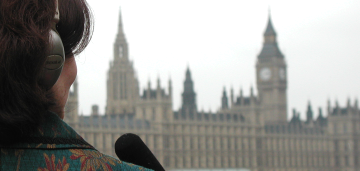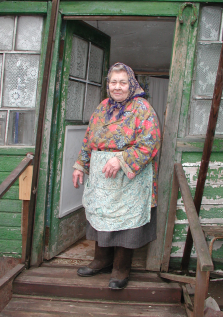

House of Sound
House of Sound Productions
HOPE I DIE BEFORE I'M OLD:
The Global Pensions Crisis
Aired on BBC World Service Radio, Spring 2003
From 2000-2003, $1.7 trillion dollars was wiped off the value of pension funds around the world. Even before the dotcom bubble burst, economists were warning that almost all of western Europe's governments would be bankrupt by 2020 if they tried to keep their pension promises to their citizens. Across the industrialized world, the days of retiring on a predictable pension after a lifetime of long service are over. In the non-industrialized world, of course, those days never arrived.
In this half-hour documentary, producer and reporter Vicki Barker takes you on a world tour of economic malaise -- and economic paradigms. She starts in the world's richest economy, the US, where millions of baby-boomers face working into their 70's -- if they can afford to retire, at all. Tom Certner, of the American Association for Retired Persons, says Americans weren't too concerned when their pension plans were rewritten to put all the risk on the employes, because markets were rising and their investments were doing well. Now, some might be having second thoughts -- too late.
Then it's on to the 2nd-biggest economy, Japan, home to the most rapidly-ageing society on the planet. Low immigration and falling birth rates mean that close to 20% of the population is now over 65; by the year 2020, there will only be 1.5 workers per pensioner: a prescription for sky-high taxes, social calamity -- or both. And, as Japan goes, so goes the rest of the industrialized world. OECD analyst Monica Queissnertells Barker we will all have to work longer; and, yes, she does worry about her own old age, "a little bit."
If people in the rich, capitalist world are having to lower their expectations for their old age, old people in the former communist countries have lost all of communism's guarantees -- too late to make new lives under capitalism. Mario Nuti, of the London Business School, says, however badly the transition was handled, there is no going back to the old system, which was politically and financially bankrupt. When it comes to pension security, we have all been expelled from the worker's paradise.
And what of the roughly one-half to two-thirds of the people on this planet who go from birth to death never expecting a pension check? They belong to the invisible economy, also known as the "informal" or "peasant" economy. We hear from Evair Silva, an illegal internal immigrant in Sao Paolo, Brazil and Bridget Nkosi, who runs a struggling shop in Johannesburg. Neither believes they'll ever save enough to retire. But Russian sociologist Teodor Shanin says neither is likely to starve. Shanin first developed the concept of the peasant economy: an economy where the contracts aren't written, but where family members are bound by ties of love and responsibility.
So who, then, is better off, Barker asks Shanin: the pensioner in the developed world who has a monthly check but no significant family ties; or the old woman living in a hut with no money but with an extended family to share in her care? In terms of financial security, Shanin says, the written contract of a pension helps the European pensioner. But in terms of quality of life and a comfortable old age and death, it is the informal economy, he says, which is superior.
So old age security, then, isn't necessarily measured in bank balances. Nevertheless, there isn't a single country on earth which has solved its pension problem, as Richard Ramsden a pensions expert at Goldman Sachs, affirms. Will we in the rich world have to take a page from the peasant economy's book and hope our children will come to our rescue? "Just the other day, I asked my 6-year-old if she would pay for my pension," Ramsden says. "She said no, and that to me was conclusive evidence that I was going to have to save a lot more for my retirement!"
Right up until the moment the dotcom bubble turned to rubble, many Wall Street analysts suggested the boom might never end; it was the "new paradigm," they said. But, Barker wonders, what if the pensions crisis is the real "new paradigm"? Is it possible that this crisis is a crisis of confidence in capitalism, itself?
Not a crisis of confidence but a crisis of expectation says Lord Desai of the London School of Economics. An avowed Marxist ("because only a Marxist understands capitalism"), he says workers across the developed world need to understand their governments will not take care of them in their old age. In a globalized economy, he says, the nation-state is no longer going to be able to keep its pension promises: "That game is over!"
So there are no quick answers, just crooked sign posts pointing to an uncertain future. But, Barker wonders, how many of us may find our old age security will depend on a different kind of investment? As the sociologist Teodor Shanin suggested, ultimately a comfortable old age may depend on how we have loved our children ... and how our children love us.
Produced and Presented by Vicki Barker
